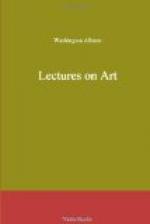As the greater part of those Pleasures which we propose to discuss are intimately connected with the material world, it may be well, perhaps, to assign some reason for the epithet mental. To many, we know, this will seem superfluous; but, when it is remembered how often we hear of this and that object delighting the eye, or of certain sounds charming the ear, it may not be amiss to show that such expressions have really no meaning except as metaphors. When the senses, as the medium of communication, have conveyed to the mind either the sounds or images, their function ceases. So also with respect to the objects: their end is attained, at least as to us, when the sounds or images are thus transmitted, which, so far as they are concerned, must for ever remain the same within as without the mind. For, where the ultimate end is not in mere bodily sensation, neither the senses nor the objects possess, of themselves, any productive power; of the product that follows, the tertium aliquid, whether the pleasure we feel be in a beautiful animal or in according sounds, neither the one nor the other is really the cause, but simply the occasion. It is clear, then, that the effect realized supposes of necessity another agent, which must therefore exist only in the mind. But of this hereafter.
If the cause of any emotion, which we seem to derive from an outward object, were inherent exclusively in the object itself, there could be no failure in any instance, except where the organs of sense were either diseased or imperfect. But it is a matter of fact that they often do fail where there is no disease or organic defect. Many of us, perhaps, can call to mind certain individuals, whose sense of hearing is as acute as our own, who yet can by no possibility be made to recognize the slightest relation between the according notes of the simplest melody; and, though they can as readily as others distinguish the individual sounds, even to the degrees of flatness and sharpness, the harmonic agreement is to them as mere noise. Let us suppose ourselves present at a concert, in company with one such person and another who possesses what is called musical sensibility. How are they affected, for instance, by a piece of Mozart’s? In the sense of hearing they are equal: look at them. In the one we perceive perplexity, annoyance, perhaps pain; he hears nothing but a confused medley of sounds. In the other, the whole being is rapt in ecstasy, the unutterable pleasure gushes from his eyes, he cannot articulate his emotion;—in the words of one, who felt and embodied the subtile mystery in immortal verse, his very soul seems “lapped in Elysium.” Now, could this difference be possible, were the sole cause, strictly speaking, in mere matter?




